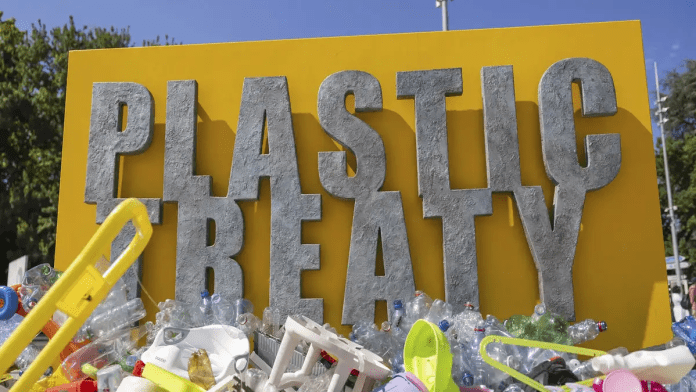🕒 Last updated on August 11, 2025
As negotiations for a Global Plastics Treaty entered their halfway stage in Geneva, Switzerland, the scene outside the United Nations’ Palais des Nations sent a strong and silent message.
Protest greets delegates in Geneva
More than 200 campaigners from civil society groups stood along the pathway, holding signs in multiple languages. They were not chanting or shouting, but their presence and banners made it clear: the world cannot wait any longer for action against plastic pollution.
The protest took place at the same time as the Intergovernmental Negotiating Committee’s second session. This committee is tasked with creating a legally binding treaty to tackle the growing crisis of plastic waste and toxic chemicals in plastic products. Many campaigners are concerned that without urgent changes to the talks, promises made by countries will not be kept.
These groups say that the process needs fixing. They argue that the treaty must not only manage waste after it is created but also address the problem at its very beginning—the large-scale production of plastic and the harmful chemicals used in it.
Hottest Month, Highest Costs: How Climate Extremes in July 2025 Shook the Global Economy
Calls for binding rules and production caps
Campaigners believe that the goals of banning single-use plastics, capping global plastic production, and placing strong restrictions on dangerous additives are slipping out of reach. They warn that these goals will remain only words on paper if the biggest plastic-producing countries are allowed to water down the treaty.
Many of these large producers, along with powerful fossil fuel and petrochemical industry lobbyists, are pushing for a weaker deal. Instead of limiting production, they promote downstream solutions such as improved recycling. But scientists have pointed out that less than 10% of plastic products ever get recycled. This means the majority of plastic ends up as waste, polluting the environment for centuries.
Some countries, especially in the Global South, are not major plastic producers but are heavily affected by waste shipments from richer nations. The United States alone sends over a billion pounds of plastic waste to low-income countries every year. Campaigners argue that this practice shifts the burden onto communities that are already struggling with environmental and health challenges.
Health and environmental experts have joined the call for stricter measures. They argue that without firm caps on plastic production and bans on toxic chemicals, recycling and waste management will never be enough. Packaging should be designed for safety, reuse, and genuine recyclability from the start, they say, to prevent further harm to both people and nature.
Industry influence and growing production
Concerns are mounting over the level of influence held by industry representatives at the talks. Reports from Geneva suggest that fossil fuel and chemical company lobbyists outnumber independent pollution experts by four to one. These lobbyists have been working alongside oil- and plastic-producing nations to push for a treaty that focuses mainly on end-of-life waste solutions, rather than cutting production.
Meanwhile, major petrochemical companies have not slowed down their output. Since work on the pact started in 2022, manufacturing capacity has actually increased by 1.4 million tons. Just seven of these corporations have sent a combined total of 70 lobbyists to the current round of talks. Campaigners fear that this level of industry presence could result in a treaty that prioritizes corporate interests over environmental health.
A recent study published in a leading medical journal has highlighted the urgency of the situation. It cautions that the output of plastic is expected to nearly treble by 2060 unless swift and decisive action is taken. This would worsen pollution levels, making it even harder to protect ecosystems, wildlife, and human health.
🌍 Climate collapse ahead? Norway’s $1.6 trillion fund warns of 19% U.S. portfolio loss
For those gathered in Geneva, the message is straightforward: the more plastic the world produces, the more pollution it must deal with. Protesters maintain that the treaty should not only manage the effects of pollution but also work to prevent it at its source. They reject any approach that delays real change or avoids binding production targets.
As the talks continue, the protest outside the Palais des Nations serves as a visible reminder of the public’s demand for bold and enforceable action. Many of those present believe that if certain countries cannot agree to strong measures, they should step aside rather than block global progress toward a world free of plastic pollution.

